#tomoko's translations
Explore tagged Tumblr posts
Text
Ryomen Sukuna (q&a official fanbook)
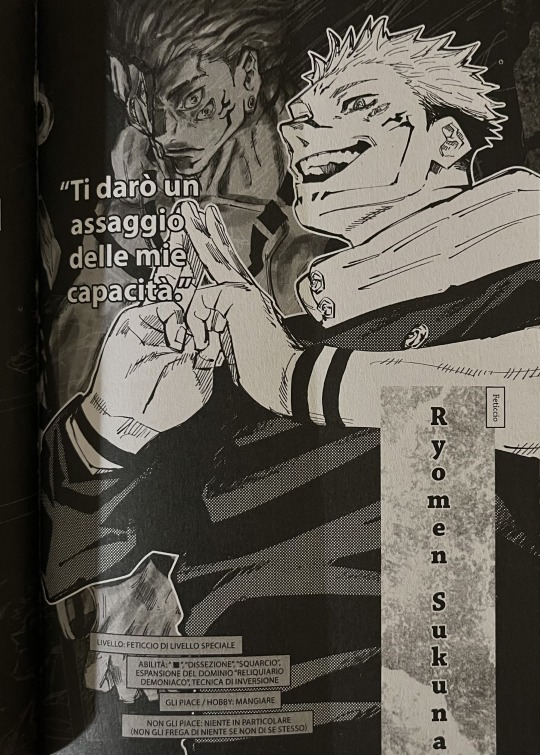
"I will give you a taste of my abilities".
Level: cursed object
Skills: ”◼️”, dissection (dismantle), gash (cleave); domain expansion: Demonic Reliquary (Malevolent Shrine); Reverse Cursed Technique
He likes it/hobbies: eat
Dislikes: nothing in particular (he doesn't care about anything except himself).
Q&A about Sukuna
Q: It was said of Sukuna that he was a real human. Was he by any chance a dark sorcerer when he was alive?
A: To be sure, he was, but I think he was closer to a natural disaster.
Q: Does he have memories of when he was a human?
A: More or less, but it is not clear whether the people around him perceived him as “human” this also applies to Sukuna's perception of himself.
Q: When he was human, was he feared like Gojo is today?
A: He cannot be compared to Gojo. That doesn't mean he wasn't feared, the point is that in the past both dark sorcerers and curses were much more ferocious than today. It is as if they slowly calmed down and then started to heat up again after Gojo's birth.
Q: When he was human, how was he treated by the people around him?
A: They were all terrified of Sukuna. Both before and after he became a cursed object, he was always known as the “King of Curses”.
Q: What is Sukuna's greatest pleasure?
A: Eating.
Q: What do his fingers taste like?
A: Since they're from adipocere, it should be a taste similar to soap...
Q: When Itadori died, was there any effect on Sukuna inside him?
A: No. There was still time for Sukuna to resurrect him with the reversal technique. However, if a little more time had passed, Sukuna would also have died.
Q: Is his field of vision connected not only with Itadori, but also with the curses that have absorbed his fingers?
A: If a finger is sealed or absorbed by a cursed spirit, Sukuna can gather almost no information from the finger. He can only sense whether the finger is close or not. If a finger is not sealed, Sukuna has a general idea of the situation around it. That's why he commented “That's good” when Fushiguro fought against the curse at the Yasohachi Bridge.
Q: Did Sukuna have a wife and children when he was alive?
A: No. He had only Uraume to serve him.
Q: How much do humans know about Sukuna's technique?
A: For those who have read the various testimonies, there is a lot about sharp attacks. However, it is possible that some do not know about the flames.
Q: Gojo said that Itadori is also a tracker of Sukuna's fingers. Is his statement correct?
A: The only thing he was wrong about was the fact that Sukuna was trying to regain his power by collecting fingers.
Q: In some places in Japan, the real Ryomen Sukuna is considered a hero and is also the name of a local product*. Will this situation be reflected in your work?
A: No. The character of Sukuna in Jujutsu Kaisen is as powerful as the real Sukuna, but has no other connection to the real Sukuna.
Q: Did you intend to bring in Ryomen Sukuna when you made Volume 0?
A: No, not at all!
*The Sukuna gourd that grows in the mountains of Gifu Prefecture.
(maybe there is someone who might be interested in this: in the past I have also translated other official fanbook pages of some characters, for example gojo and megumi together with other characters. if you are interested in reading them, you can find them on my profile/blog)
#tomoko's translations#tomokotranslates#fanbook#jjk fanbook#ryoumen sukuna#jjk#sukuna ryomen#jjk manga#jujutsu kaisen manga#jujutsu kaisen#sukuna#ryomen sukuna#jjk sukuna#jujutsu kaisen fanbook
80 notes
·
View notes
Text
Here's Wakana Imura's illustration for celebrating 1 day until the movie's release.

Here's the mini shikishi moviegoers can get during the 1st week of the movie's release, illustrated by Tomoko Miyakawa.

The movie merch (acrylic stands and so on) will go on sale tomorrow. More details here.
Sales are already open (they opened at 00:00/12 am on the 23rd of Jan. 2025) for the live viewing at 109 Cinemas (first come, first served). Other cinemas will have their sales open at 00:00/12 am on the 24th of Jan. 2025 (all times/dates JST). Shinjuku Wald 9 plans to sell merch at a booth on the 10th floor. More details here.
For the stage greeting at Shinjuku Wald 9, please refrain from bringing horizontal banners, uchiwa, glowing penlights etc. so as not to obstruct the vision of others in the area. If you are found to be acting in a way that hinders the progress of the event, the event may be called off.
Before the movie, be sure to watch each season in the Boueibu series. In Japan, you can watch via ABEMA, the d Anime Store, U-NEXT, DMM TV, Hulu, Bandai Channel and Niconico Channel. Outside of Asia, you can watch via Crunchyroll.
Quiz time: 'Karurusu's full name is "Karurusu de Yutari Honyarara". Furanui's full name is "Furanui de ______ Honyarara". What goes in the gap?' (options from top to bottom: Kichiri, Kiran, Shakin, Bishi)
YouTube short time: "Goura-san is Cute, Isn't He?" from LOVE! LOVE! ep. 11.
Happy 1 day until the movie from Love Macho.

It’s 1 day until the movie and today’s shikishi is from En’s voice actor, Umehara. Follow the official X account and repost this tweet by the 23rd of Jan. 2025 at 23:59 (JST), but remember shikishi will only be sent to those within Japan.

(Update: Changed "real name" to "full name".)
#boueibu#Binan Koukou Chikyuu Boueibu ETERNAL LOVE!#binan koukou chikyuu bouei bu love!#binan koukou chikyuu boueibu love!#anime event#anime merch#Yumoto Hakone#Akihiko Beppu#Haruhiko Beppu#VEPPer#Tomoko Miyakawa#binan koukou chikyuu bouei bu love! love!#binan koukou chikyuu boueibu love! love!#(That legalese...I haven't had to translate that sort of text in a hot second.)#(Checking up the worldwide availability of Boueibu was sure nostalgic...) <- has a page on where to stream it#(I almost hit post...then more tweets come...plus it's Rei from HypMic's b'day today so there were already lotsa tweets.) *sighhhhhhh...*#boueibu hk#binan koukou chikyuu boueibu happy kiss!
40 notes
·
View notes
Text
youtube
Another Thieves Den interaction, this time with Ange and Moko!
#persona#p5x#persona 5 the phantom x#manaka nagao#ange#tomoko noge#moko#game content#translations#open beta#version 4.0#Youtube
14 notes
·
View notes
Text
ooc./ Encima, el sueño explicaba que Joseph es un buen sujeto pero quizás el error fue del autor hacer que se casara.
Buen padre pero pésimo esposo, quizás hubiese sido mejor que no se casase pero, considerando los años dónde transcurrió la historia, quizás si se hubiese casado por el compromiso de haber dejado claramente en cinta a Suzie. Pero, creo, que ese amor romántico se pudo haber transformado con el pasar de los años en un cariño sincero donde claro, sigue amándola pero no de esa manera sensual que tienen las relaciones románticas. Sino un amor más puro, aquel de compañerismo y gran amistad, de cierta forma.
Pero si creo que Suzie se hubiera enojado por la infidelidad con Tomoko, no por la infidelidad en sí; porque yo creo que ya hablaron que son como muy viejos para divorciarse pero tampoco es que van por ahí explicando que siguen casados porque era mucho papeleo y, la verdad, no queda tan bien visto que se divorcien a esas alturas (según ellos), entonces seguían casados en papel por costumbre pero cada uno podía hacer su vida. Siento que Suzie se enojó por el producto de la infidelidad, Josuke, porque cómo diablos se le ocurre a Joseph ser un padre presente para una hija, Holly, hija del matrimonio y no para Josuke, que encima de ser hijo bastardo era justamente el único varón. Si, que haga lo que quiera pero que si va a tener un hijo entonces minimo se haga responsable.
Algo asi soñe que explicaba. Pero también estaba el añadido de que yo hablaba de como Joseph probablemente siempre sufrió de estar en el closet, o al menos, era consciente de su atracción a hombres pero, dado en la época que se crió, no logró deconstruirse hasta ser un adulto mayor y, aún así, sólo se dio cuenta que si bien encontraba atractivo a otros hombres no sintió esa atracción agobiante y frustrante que tenía hacía Caesar quien fue su enemigo, rival, mejor amigo, y, si las cuentas cierran (y si Joseph se permite aceptarlo), muy probablemente su primer amor.
MENTÍ, AHORA ME FALTA HIGASHIKATA TOMOKO
¿Por qué Tomoko, una mujer en su pleno esplendor, independiente, economicamente estable y hermosisima... tendría el hijo de un romance efimero? No nos dan suficiente información de la relación entre Joseph y Tomoko, asumo que fue linda y que Joseph se tomo su tiempo cortejandola pero Tomoko pudo haber tomado la decisión de no tener a Josuke al costo de su vida inclusive Y AÚN ASÍ... Yo voy a aplicar la lógica que me aplicaron a mi (cries): "Era un hombre que ame tanto, sabía que nunca sería mío porque estaba en sus ojos, pero también sabía que con el estilo de vida que llevaba moriría pronto, o se iría a un lugar tan lejano que yo no podría seguirlo. Pero yo quería tener evidencia de ese amor, yo quería tener nuestro amor presente y vivo, entonces naciste tú".
Creo que, con eso, no hay mucha explicación que dar. Si me siento mal por Josuke, quién sabia que no tenía padre pero no la razón hasta que Jotaro se presentó ante él, eso de no saber nada y enterarte quién es tu padre cuando esta moribundo (o muerto).
#ooc.#( Blog. / Character analysis )#i'll eventually translate this only if i do end up adding joseph (+tomoko) and it will be the first headcanon i post about jojos so fast#LIKE I HAVE STUFF ABOUT MISTA........................
2 notes
·
View notes
Text
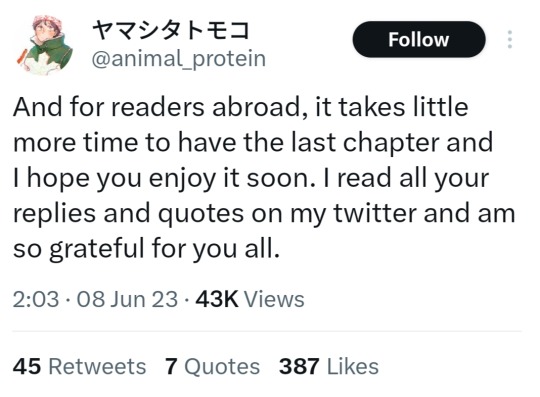
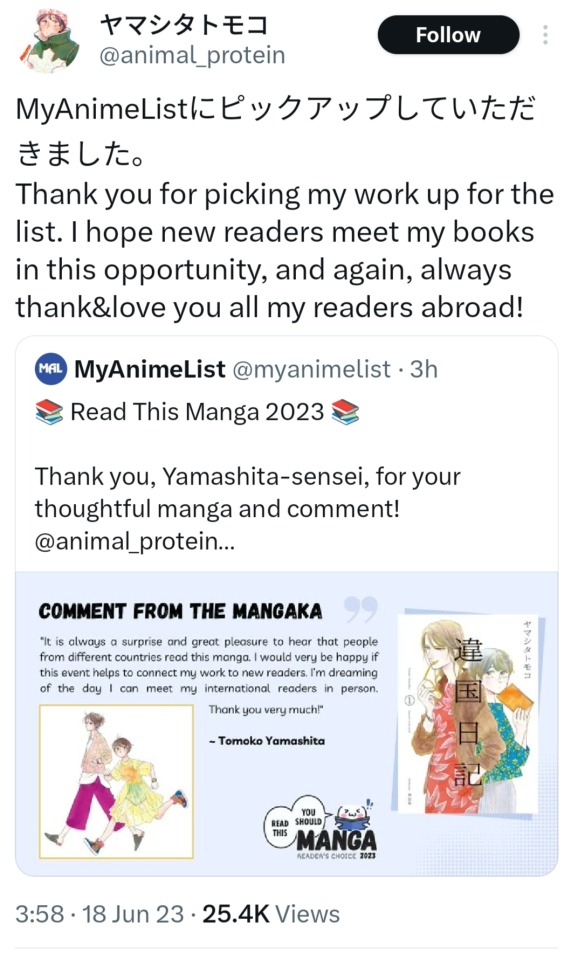
Tomoko Yamashita's comment for her overseas fans!
#tomoko yamashita#ikoku Nikki#i'm glad she seems okay with fan translations because people on twitter are NOT BEING DISCREET about reading them
26 notes
·
View notes
Text
Hi guys so uhh yeah I will introduce myself,so yeah I like Roblox and videogames in general,ddlc,yandere simulator and that type of shit, I have trouble socializing and stuff,I like anime,I am 10 y/o, I hate myself,I am Mexican but I speak English,I like drawing, and thats it///////////////////////////////////////////////Hola, chicos, así que uhh, sí, me presentaré, así que sí, me gusta Roblox y los videojuegos en general, ddlc, yandere simulator y ese tipo de mamadas, tengo problemas para socializar y esas cosas, me gusta el anime, tengo 10 años, me odio a mí misma, soy mexicana pero hablo inglés, me gusta dibujar, y eso es todo
1 note
·
View note
Text
They’re Back! Araiso Private High School Student Council Executive Committee Vol. 2 Extra: Fairy Tale Characters the Cast Wish They Were
#Ishikawa Hideo#Morikawa Toshiyuki#Kondou Takashi#Kisaichi Atsushi#Sasanuma Akira#Shimura Tomoyuki#Katsu Anri#Itou Kentarou#Kawakami Tomoko#Toriumi Kousuke#私立荒磯高等学校生徒会執行部#Araiso Private High School Student Council Executive Committee#Wild Adapter#minekura kazuya#drama cd#translation
1 note
·
View note
Text
Something that really annoys me is that whenever there's an ambiguous depiction of queerness in fiction is that whenever an alternative explanation is given, certain people will assume the alternative to be true despite queerness being just as likely. These explanations aren't even necessarily wrong, it's just that people will run with those if it means not acknowledging that characters might be gay.
Like, for example, they never outright say that Marcille loves Falin, but a lot of people (myself included) believe this to be the case. But the fact that an alternative explanation for their closeness is provided is often used as a reason why it couldn't possibly be romantic. The alternative explanation in this case is that learning that her best friend got eaten forces her to confront her fear of outliving her friends. And that motivates her to try to save her. The problem with this is that it doesn't actually disprove the idea that Marcille loves Falin. Marcille loving Falin is just more motivation for Marcille. And sure, Marcille could be just as motivated if she thought of Falin as her platonic bestie, but why do people use the possibility of that as a reason to discount romance as a possible motivation for her?
Anime fans did the exact same thing with Madoka Magica. They cite Homura's solitude as the reason for her obsession with saving Madoka. But once again, that doesn't contradict romantic attraction. And when it gets confirmed that Homura loves Madoka (and that Sayaka and Kyoko love each other) in Rebellion, people just claimed "fan pandering" and "translation error".
And when an alternative explanation isn't provided, some anime fans will provide one for them. Like, in Watamote, Asuka constantly tries to get closer and closer with Tomoko. Some people suspect that this means she has romantic interest in Tomoko, but others choose to interpret her interest as curiosity and intrigue. Except curiosity doesn't explain the lap pillows or the nude FaceTime or offering her boobs to her or wanting to go to the same college or saying she spends most of her time thinking about Tomoko.
Would this problem be fixed if characters just said they were queer? No.
Dungeon Meshi is complete, so they won't confirm or deny Marcille's feelings. And Homura, Sayaka, and Kyoko had all been confirmed queer, but people still denied it. And Asuka has good reasons not to admit her feelings for Tomoko. Most notably, the world of Watamote is incredibly heteronormative, so people generally won't admit to being queer. And despite Tomoko being in a glass closet, she still doesn't even admit her bisexuality to herself, so it makes sense for Asuka to hold off on telling her anything. I would like Asuka to admit her feelings by the end, but as we are right now, it's better that she doesn't.
Insisting that we must always immediately confirm queerness and that it can never be ambiguous because some people will run with any chance to deny it will greatly limit the kinds of stories that can be told.
#Dungeon Meshi#Delicious In Dungeon#Puella Magi Madoka Magica#Watashi Ga Motenai No Wa Dou Kangaetemo Omaera Ga Warui!#It's Not My Fault That I'm Not Popular!#Watamote#Marcille Donato#Falin Touden#Homura Akemi#Madoka Kaname#Sayaka Miki#Kyoko Sakura#Asuka Katou#Tomoko Kuroki#Anime#Manga#Yuri
478 notes
·
View notes
Text
Tommy february6 Lyrics: I still love you boy
English translation and romanization below the cut.
Keep reading
19 notes
·
View notes
Text


April is National Poetry Month.
Waka, or Japanese poetry, flourished in the court culture of the 6th to the 14th century in Japan. One of the well-known waka poets of this period was Ono no Komachi (小野 小町, c. 825 – c. 900). She was one of the Rokkasen (六歌仙, "six poetry immortals) of the early Heian period and was renowned for her unusual beauty. She also counts among the Thirty-six Poetry Immortals, but not much about her life is known for certain. Here's one of her poems included as #9 in Fujiwara no Teika's Ogura Hyakunin Isshu (百人一首), a classical Japanese anthology of one hundred Japanese waka by one hundred poets.
花の色はうつりにけりな いたづらに わが身世にふる ながめせしまに English Translation: A life in vain. My looks, talents faded like these cherry blossoms paling in the endless rains that I gaze out upon, alone. (Source: Wikipedia)
Image 1: Detail from “Yoshino and Tatsuta.” Early 17th century. Right screen of a pair of six-panel screens; ink, color, and gold on paper, each 176.8 x 415.6ch. Nezu Museum, Tokyo. Sakomura, Tomoko. 2016. Poetry as Image : The Visual Culture of Waka in Sixteenth-Century Japan. Leiden: Brill. Image 2: Poetess, Ono no KomachiSuzuki Harunobu, 1725-1770, Japanese [artist]Color woodblock print21 x 28.9 cm.JapaneseRepository: Harvard Art Museums, Cambridge, Massachusetts, United States
#NationalPoetryMonth#Waka#Poetry#JapanesePoetry#OnonoKomachi#JapanesePoet#HarvardFineArtsLibrary#Fineartslibrary#Harvard#HarvardLibrary
42 notes
·
View notes
Text
Yuri Manga 'I Can't Say No to the Lonely Girl' Released
On March 19, Kodansha Comics released the first volume of Kashikaze's Yuri manga I Can't Say No to the Lonely Girl (Ronriigaaru ni Sakaraenai).
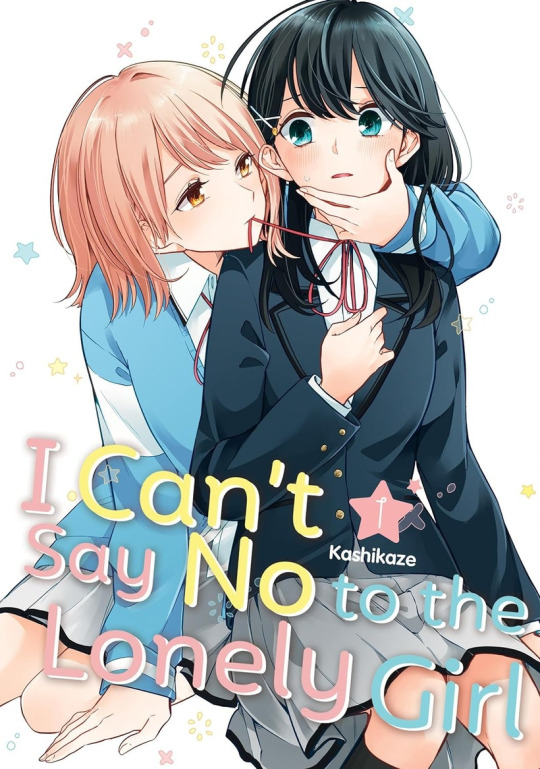
The publisher describes the series:
In this juicy yuri manga, the goody-goody high school girl Sakurai meets a lonely girl—and ends up entangled in a web of blackmail that might just lead to romance. It’s hard to keep up with school when you can never say no to a devious classmate!
The first volume begins when straight-laced high school student Sakurai asks her teacher to write her a recommendation letter. In exchange, Sakurai has to convince truant delinquent Honda to come to school. Sakurai agrees but soon finds that Honda has a deal of her own. For every day Honda attends school, Sakurai must grant her one "wish..."

I Can't Say No to the Lonely Girl was serialized in Comic Yuri Hime from October 2019 until its conclusion in October 2022. Ichiojinsha collected the series in six published volumes in Japanese.
Kashikaze released a follow-up one-shot doujin, Lonely Girl ni Sakaraenai dj—Kekkyoku Sonna Kimi ga Suki, in 2023, following side characters Wakana and Yuina.
The second English volume is scheduled for release on May 28. Diana Taylor translated the manga, with lettering by Belynda Ungurath and editing by Tomoko Nagano.
Check out the first volume of I Can't Say No to the Lonely Girl today digitally and in paperback: https://amzn.to/3TwEOCo
Reading official releases helps support creators and publishers. YuriMother makes a small affiliate commission from sales to help fund future coverage.
375 notes
·
View notes
Text
Q&A about Gojo Satoru (Jjk official fanbook)
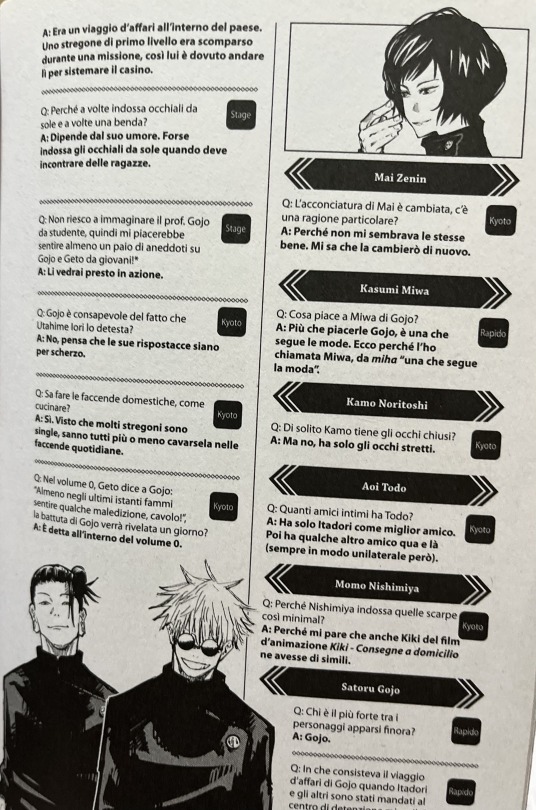
Q: Who is the strongest character to appear?
A: Gojo.
Q: What was Gojo's business trip when Itadori and the others were sent to the juvenile detention centre?
A: It was a business trip within the country. A first-level sorcerer had disappeared during a mission, so he had to go there to clean up the mess.
Q: Why does he sometimes wear sunglasses and sometimes a blindfold?
A: It depends on his mood. Maybe he wears sunglasses when he has to meet girls.
Q: I can't imagine Gojo-sensei when he was a student, so I'd like to hear at least a couple of anecdotes about Gojo and Geto as young boys.
A: You'll see them in action soon.
Q: Is Gojo aware that Utahime Iori hates him?
A: No, he thinks her bad answers are a joke.
Q: Can he do household chores, like cooking?
A: Yes. Since most sorcerers are single, they all know how to do (more or less) daily chores.
Q: In volume 0, Geto says to Gojo: "At least in my last moments let me feel some curse, damn it!", will Gojo's sentence be revealed one day?
A: It is said within volume 0.
#tomoko's translations#tomokotranslates#jjk#fanbook#jjk fanbook#jujutsu kaisen fanbook#gojo satoru#gojo sensei#jujutus kaisen#satoru gojo#jujutsu kaisen manga
30 notes
·
View notes
Text
"Repent and Make Efforts"
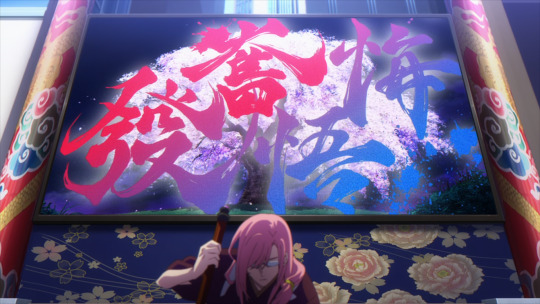
Kaoru's calligraphy display in episode 5 is very obviously targeted, but between natural difficulties in translating idioms, changes made in the English dub, and misunderstandings of the general meaning of "repentance", exactly what he's communicating often gets lost in translation - which is a shame, because it's not only a very telling moment about Kaoru's own feelings about Adam, but one that ends up being very important to the themes of the entire show and many of the central character arcs.
To give some quick establishing information, what Kaoru is writing in this scene is a called a yojijukugo (四字熟語), or four-character idiom - set idiomatic phrases that are very similar to (and originate from) Chinese chengyu (成语), which you may be familiar with if you've read any linguistic analysis of danmei. Four-character idioms are very common subjects for calligraphers like Kaoru, and the ways they can be used in speech make them very difficult to translate concisely. The particular idiom Kaoru has written here, read from right to left, is 悔悟奮發, a real four-character idiom (though usually written 悔悟憤発 in modern Japanese - Kaoru is using the Chinese hanzi.)
Read kaigo funpatsu, both the Crunchyroll subs and the dub translate this as "repent and make efforts", which is... fine enough given the complexity of translating yojijukugo. It's quite a literal translation, looking at the phrase broken down into its components - 悔悟 can indeed be translated to "repentance", and 奮發 means "to exert oneself." As an idiom, it means "to regret one's mistakes, and work hard to recover." It generally refers to remorse, but can also mean coming back from a loss. In this exchange from a Japanese website explaining the use of the idiom, it's used to describe recovering after a loss in a competition:
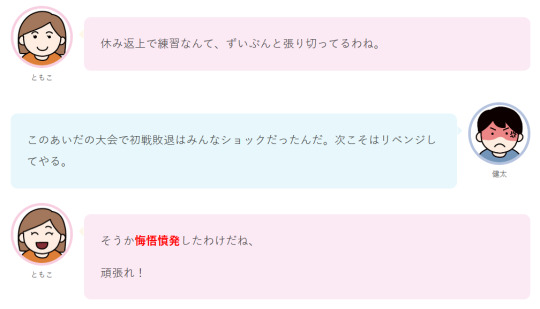
Tomoko: You must be in high spirits, to be practicing on your day off. Kenta: Everyone was shocked when I was eliminated in the first round of that tournament the other day. Next time I'll get my revenge. Tomoko: Oh, so you're trying to make a comeback*, good luck!
(*in a perfect example of how difficult yojijukugo can be to translate when used in regular speech, a translation as literal as "repent and make efforts" would sound very silly in English here.)
And this idiomatic meaning is how Kaoru explains it - and where I believe some misunderstandings are originating from, both due to the overall interpretation of the word "repent", as well as changes in nuance in the explanation given in the dub. To begin with, let's look at Kaoru's dialog in Japanese. (Due to him immediately explaining the meaning, I chose to leave kaigo funpatsu untranslated, unlike the official subs.)
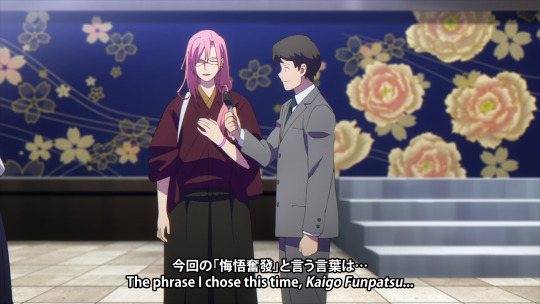
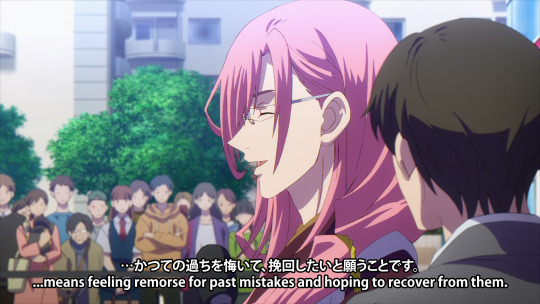
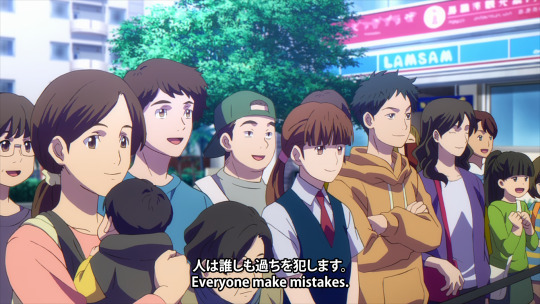
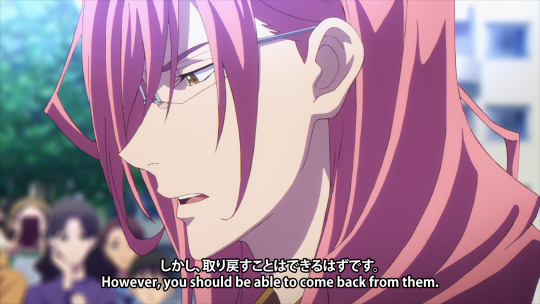
And the same dialog in the dub:
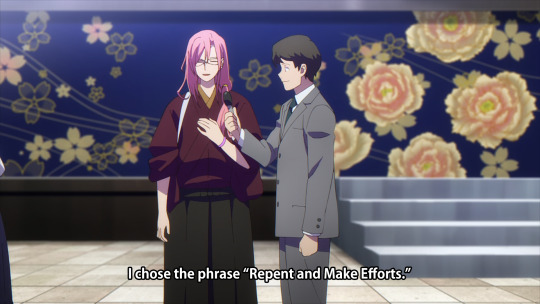
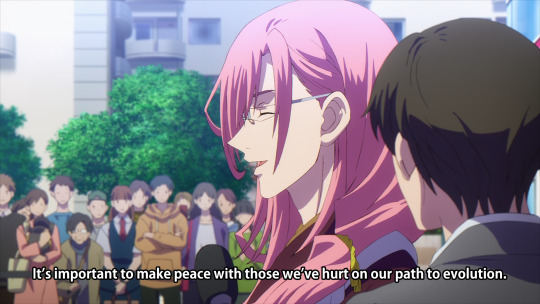
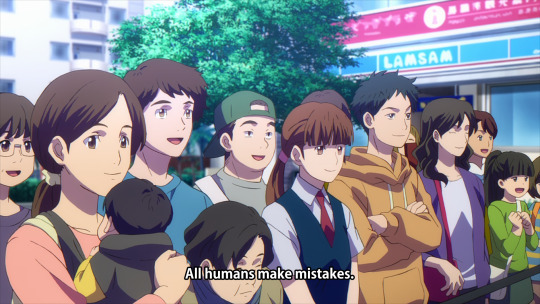
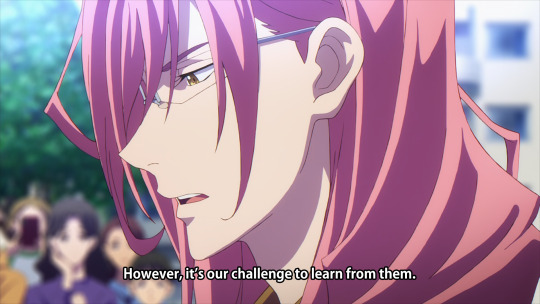
It should be apparent just from this that Kaoru in the original and Kaoru in the dub are saying completely different things. Originally, Kaoru makes no mention of making peace with people that have been hurt, because that isn't what kaigo funpatsu is referring to. Kaigo is personal, internal regret - kaigo funpatsu is about self-reflection, recognizing one's mistakes and striving to do better, considering your past in order to take your next steps in the future. That could involve making amends with wronged parties, but it's not part of it inherently - Kaoru's original dialog doesn't even allude to people being hurt at all, because it's not relevant to the idiom.
It's here that I believe the word "repent" is causing some trip-ups: it's being taken in the Christian sense of atonement or penance, an action done to achieve forgiveness from others or redeem oneself for sinning, but Kaoru is simply talking about realizing you've done something wrong and feeling remorse for it. (Or, specifically, about Adam realizing he's done something wrong and feeling remorse for it.)
And while his last line in the dub is at least a bit more in the spirit of kaigo funpatsu, it's still missing what is at the heart of Kaoru's feelings about this idiom, and about the man it's clearly targeted at - the idea of coming back from one's mistakes, something that does not come up in the dub at all. The first word Kaoru uses, bankai (挽回), does mean "to recover", but also "to regain what was lost" or "to return to the original state." Torimodosu (取り戻す), as well, specifically means to regain something that was lost - in fact, it's the very same word Tadashi uses when speaking of Adam "regaining his love."
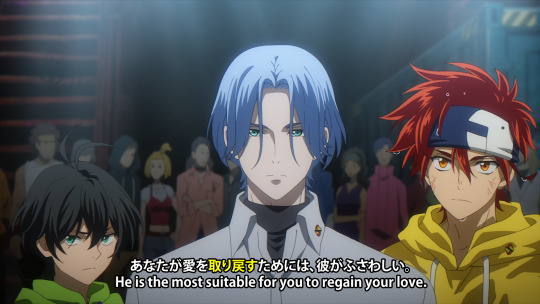
Kaoru is not asking Adam to personally make things up to him, or to anyone - Kaoru, at heart, believes in Adam, and believes that he can, and should, still come back from everything. Even in the finale - after the Full Swing Kiss, after his naive hopes of simply returning to how things were in high school are shattered - his first concern is still for Langa to make Adam understand that.
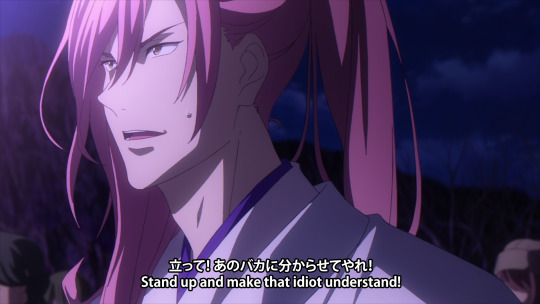
Like with Kenta in the example exchange above, kaigo funpatsu isn't about Adam atoning for his sins - it's a call for him to recognize he screwed up and move forward without making the same mistakes.
And he does, or at least he's beginning to take those steps. He recognizes the mistake that matters most to the themes of the story, and that led to everything that happened in his life since - that he lost sight of the innocent love for skating he had as a child.
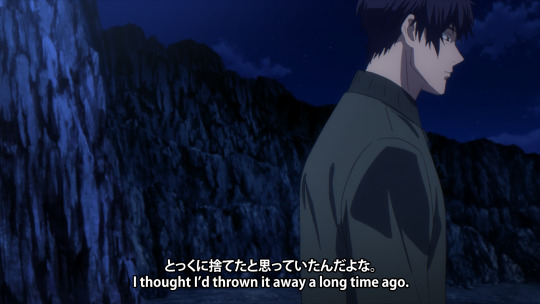
He finally admits what Tadashi meant to him;
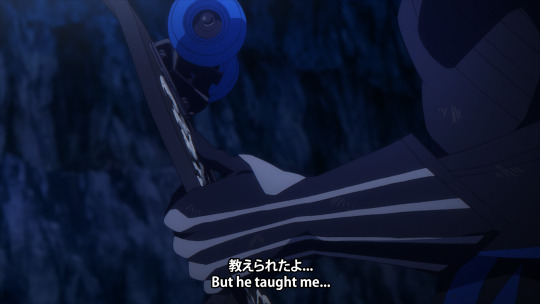
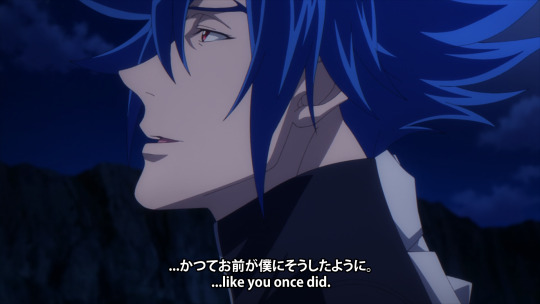
he directly defies his abusive family's wishes by working against Takano rather than throwing Tadashi under the bus;
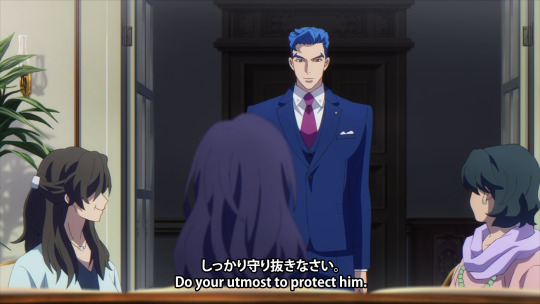
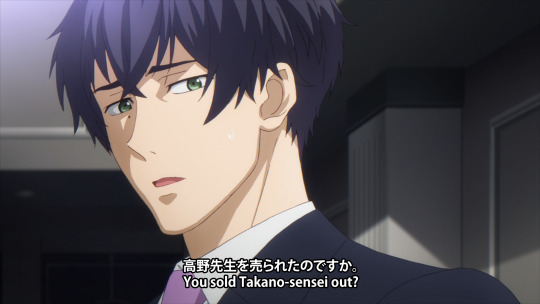
and he finally shows up as Adam in daylight, on someone else's "turf", to celebrate his own defeat - reaching out to his former friends and gracefully accepting loss, things he refused to do even an episode prior.
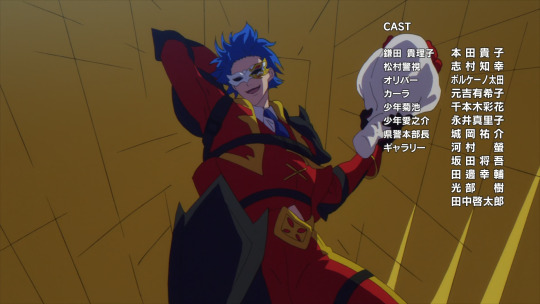
He may not be begging for forgiveness, and with this coming at the very end of the series there's a long road still ahead of him, but he's recognizing that he did things wrong and he's making an effort to move forward in a better way - and in doing that he's regained the most important thing he lost, his love of skating.
And Adam isn't the only one whose character arc kaigo funpatsu describes, either. Reki regrets his mistakes...
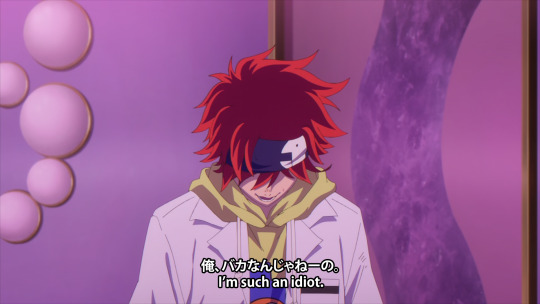
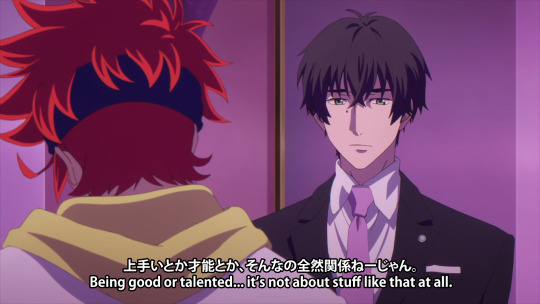
...and comes back from them.
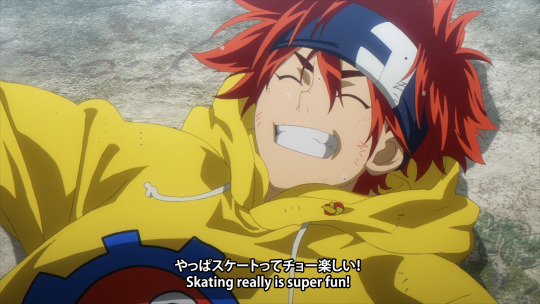
Langa recognizes his mistakes and comes back from them - and is even able to help Adam do the same.
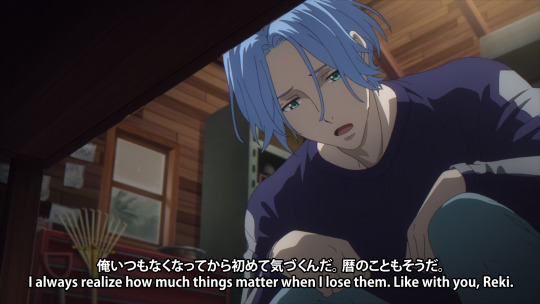
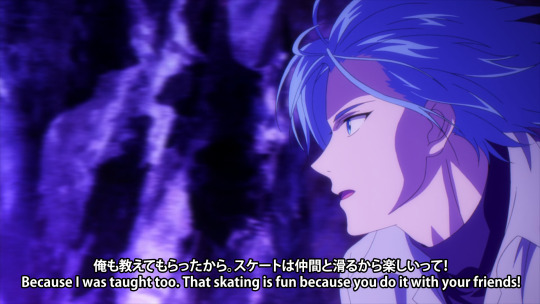
Tadashi, more clearly spelled out than anyone, recognizes his mistakes...
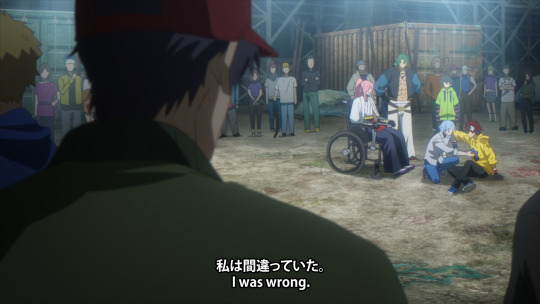
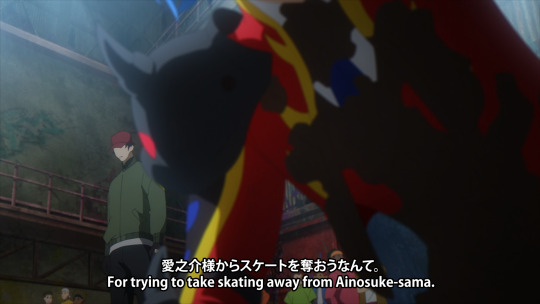
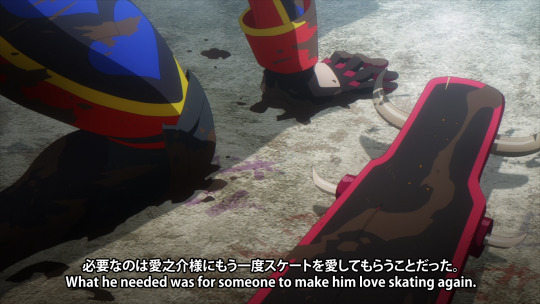
...and he's able to come back from them, too.
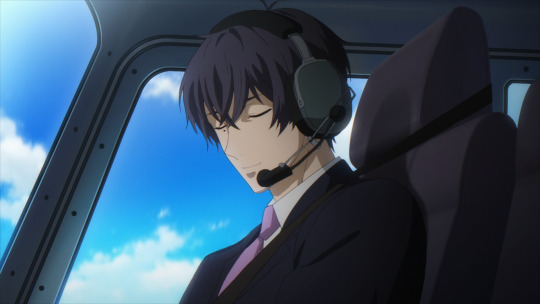
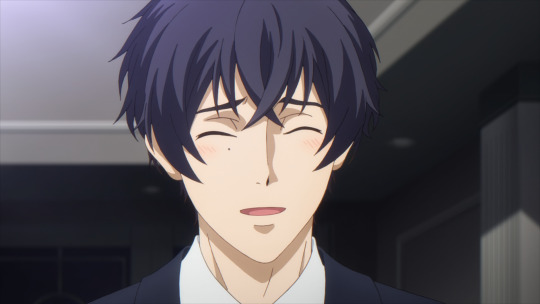
None of these resolutions involve big direct apologies, or any kind of penance to earn forgiveness. (Personal forgiveness isn't something SK8 takes much interest in dwelling on or making characters earn in the first place, and its approach to forgiveness could easily be a whole other meta in and of itself.) They don't have to, because in the end, Kaoru's idiom is not only a message to Adam - one that he ultimately does receive, if a bit later than Kaoru hoped - but a moment that spells out a big part of the show's thesis.
Everyone is going to do things wrong in their life, one way or another - but anyone who regrets their mistakes and makes an effort to do better should be able to recover from them and regain what they lost.
Only season 2 can show us what moving forward is going to look like, but when it comes to what counts to the core narrative, everyone's taken the first steps.
#sk8#sk8 the infinity#sk8 meta#meta#kaoru sakurayashiki#adam sk8#ainosuke shindo#reki kyan#langa hasegawa#tadashi kikuchi
152 notes
·
View notes
Text
youtube
Another Thieves Den interaction, this time with Summer Motoha and Summer Tomoko! Not sure exactly how many of these there are in the game right now, but I'll keep translating and posting them as I find them.
#persona#p5x#persona 5 the phantom x#motoha arai#tomoko noge#closer#moko#game content#translations#open beta#version 3.0.1#Youtube
17 notes
·
View notes
Text

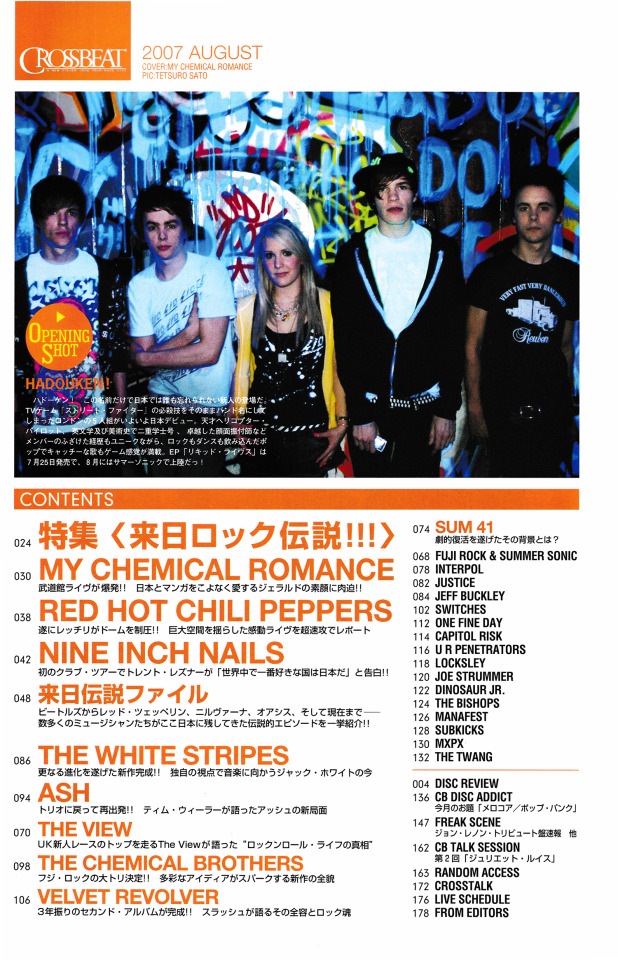

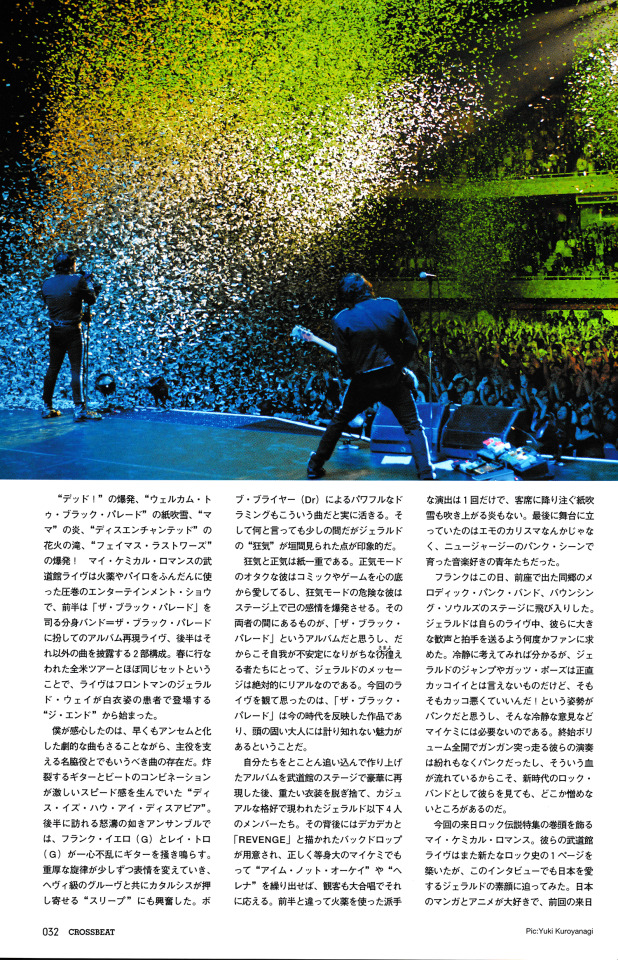

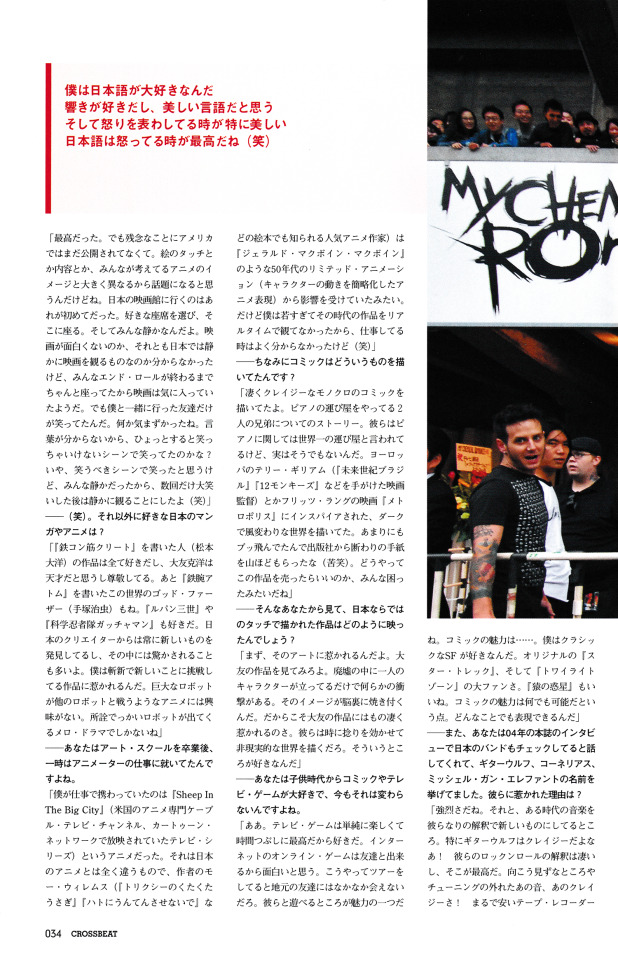
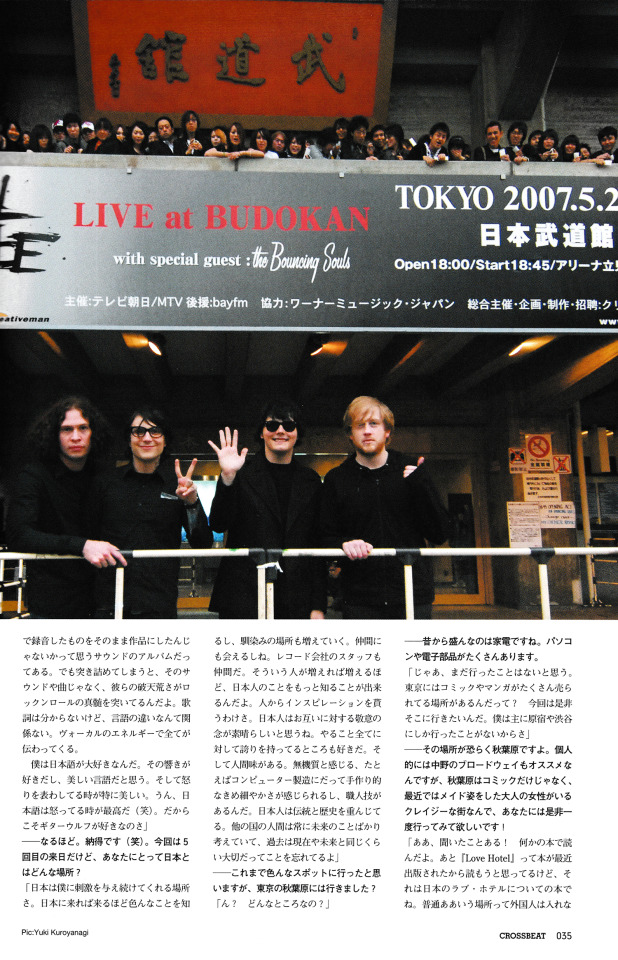
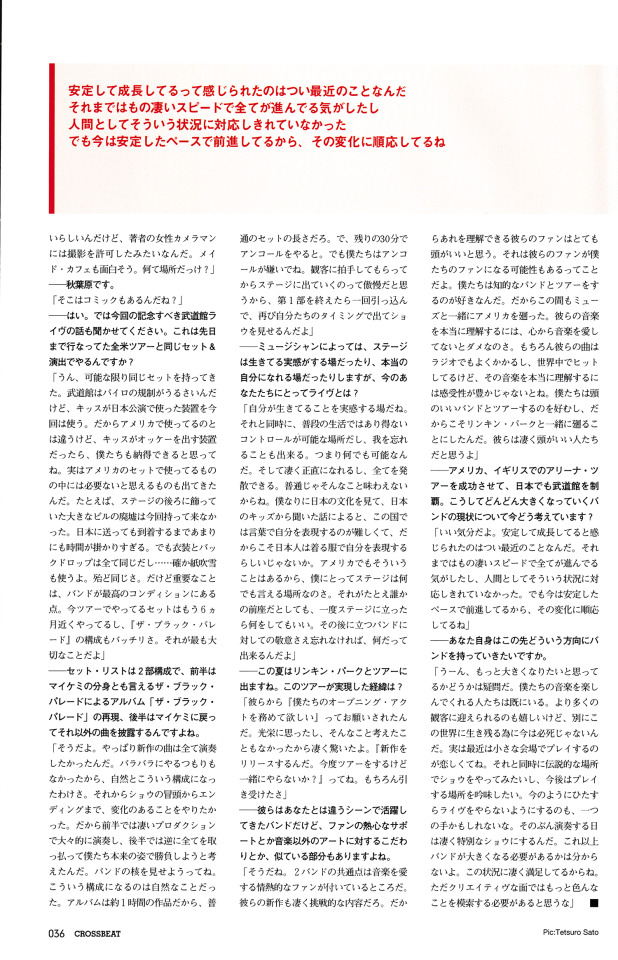

crossbeat magazine, aug 2007
translation/transcription under cut
Crossbeat - AUG 2007 - TRANSLATION
PAGE 30-31 (excluding cover and contents page):
Special feature on rock legends coming to Japan
MY CHEMICAL ROMANCE
AKIRA, Tekkonkinkreet, Lupin III - "I'm attracted to works that are innovative and take on new challenges. I love them. I can't stop thinking about them."
Welcome to MCR Theatre @Budokan!! A drama of destruction and rebirth explodes in a spectacular live performance!! Japan and Manga
Interview by Takuro Ueno, interpreter: Tomoko Katsuta
We take a look at Gerard's true personality and the band's latest vision as a huge fan of the band.
Pics: Tetsuro Sato
PAGE 32:
The explosion of "Dead!", the confetti of "Welcome to the Black Parade", the flames of "Mama", the fireworks of "Disenchanted", the explosion of "Famous Last Words"! My Chemical Romance's Budokan live show was a spectacular entertainment show with plenty of gunpowder and pyro. The first half was a live performance of the album in which they dressed up as the band The Black Parade, the alter-ego of "The Black Parade", and the second half was a performance of other songs. The set was almost the same as the US tour in the spring, and the live started with "The End", in which frontman Gerard Way appeared as a patient in a white coat.
What impressed me was not only the dramatic songs that quickly became anthems, but also the presence of songs that could be called excellent supporting actors that supported the main characters. The combination of explosive guitar and beats in "This Is How I Disappear" created a sense of intense speed. In the second half, Frank Iero (G) and Ray Toro (G) strummed their guitars with complete concentration in the raging ensemble. The heavy melody gradually changed its expression, and I was also excited by "Sleep," which had a cathartic surge along with a heavyweight groove.
Bob Bryar's (Dr) powerful drumming also really came into play in this kind of song. And what was most impressive was the glimpse of Gerard's "madness" for a short time.
There's a fine line between madness and sanity. In his sane mode, he's a geek who loves comics and games with all his heart, while in his dangerous mad mode, he explodes with emotion on stage. I think that the album "The Black Parade" is somewhere between the two, and for those wanderers whose egos tend to become unstable because of their wandering, Gerard's message is absolutely real. What I thought after seeing this live performance was that "The Black Parade" is a work that reflects the current era, and it has an immeasurable appeal to stubborn adults.
After performing the album that they had pushed themselves to the limit and creating in a lavish manner on the Budokan stage, Gerard and the other four members shed their heavy costumes and appeared in casual clothes. Behind them was a backdrop with the word "REVENGE" written in large letters, and when the life-sized My Chemical Romance performed "I'm Not Okay" and "Helena," the audience responded with a chorus of their own. Unlike the first half, there was only one flashy performance using gunpowder, and there was no confetti raining down on the audience or flames rising up. At the end, the people who stood on stage were not emo charisma, but young music-loving men who grew up in the New Jersey punk scene.
On this day, Frank joined the stage of the opening act, the melodic punk band Bouncing Souls from his hometown. Gerard asked the fans several times during his performance to give them loud cheers and applause. If you think about it objectively, you can see that Gerard's jumps and fist pumps are not cool, but I think that the attitude of "it's okay to be uncool!" is punk, and such objective opinions are not necessary for My Chemical Romance. Their performance, which was full volume and full force from start to finish, was unmistakably punk, and it is because of this blood that they are somehow hard to hate, even when viewed as a new-age rock band. My Chemical Romance, who graces the front page of this special feature on rock legends visiting Japan, have written another page in rock history with their live performance at the Budokan, but in this interview we also get a glimpse into the true face of Gerard, who loves Japan. He loves Japanese manga and anime, and when he came to Japan last time
Pic: Yuki Kuroyanagi
PAGE 33:
he even went to the cinema. When I explained the purpose of the photo on the front page, he cheerfully agreed to a two-shot with Mario, a character representing Japan.
----What kind of image did you have of Japan before?
"I was imagining the world of Ridley Scott's film, 'The Blade Runner.' I'm also a big fan of comics and Katsuhiro Otomo's work. I especially love 'AKIRA,' so I thought it would be something like the opening scene of that story, and I think that image was correct. But I ended up loving this country even more than I had imagined. I had no idea that Japanese people were people who respected others and their environment so much, and it was refreshing to be able to come into contact with such people and have such a variety of experiences before returning to America."
----You've toured to quite a few countries, but your first visit to Japan was in 2004. What were your impressions at the time?
"I feel like I've landed on Mars. And I mean that in a good way. It's completely different from any other place I've ever been to. The cityscape, the culture, everything I could see was different from any other country. I've had the chance to tour many countries, but when I went there, I was disappointed to see that there were many similarities to America, or even the same things. But Japan is original and amazing. I was fascinated by everything, from vending machines to key chains to TVs. I don't understand what they're saying when I watch TV, but there's a lot to absorb. I'm always looking for something to stimulate me, so this country is perfect for me."
----Your first live show was on the indoor stage at Summer Sonic. How did you feel about the audience's reaction? They were really excited about songs like "I'm Not Okay."
"It was amazing! I'm so glad to get such a reaction.
I never dreamed that we would get such a good response to "I'm Not Okay" in a country we visit for the first time. But it was especially special to have such a good response in Japan. The first time we played in the UK was on tour with The Used. We have a following in the UK now, but the kids who saw our show back then seemed confused about how to respond to our music. I think they liked it, but the reaction was surprisingly calm. After that, we played in a small club in Germany, and it was a big hit. Then we came to Japan and the crowd was so excited, right? It was amazing that we were able to play in front of such a large audience, but when we played "I'm Not Okay," it was even more amazing.
----After that, you did a solo tour in Japan. What is the most memorable episode from your live shows in Japan so far?
"Well... they're all great... let me think about it... there's just so much fun to be had in Japan. The last time I played at Summer Sonic (in 2006) was memorable, the day I was on the outdoor stage in front of Linkin Park. It was a big victory to be able to play at Summer Sonic again, because it was my second time playing at a stadium. At the first Summer Sonic, I was battling drugs and alcohol. So it was impressive to come back and play on that big stage and do a show in front of thousands of people. I remember being able to show a great performance."
----When you visited Japan in January this year, you apparently went to see the film "Tekkonkinkreet."
Pic: Tetsuro Sato
PAGE 34:
I love Japanese. I love the sound of it. I think it's a beautiful language. And it's especially beautiful when people are angry. Japanese is at its best when they're angry (laughs). [top quote]
"It was amazing, but unfortunately it hasn't been released in the US yet. I think it will be a hot topic because the drawing style and the content are very different from what people think of when they think of anime. It was my first time going to a Japanese movie theater. You choose your seat and sit there. And everyone was quiet. I don't know if the movie was boring or if people in Japan watch movies quietly, but everyone stayed seated until the end credits, so it seemed like they liked the movie. But the only one who was laughing was my friend who went with me. It was kind of awkward. I didn't understand the language, so maybe I was laughing at scenes I shouldn't have laughed at? No, I think I laughed at scenes I should have laughed at, but everyone was quiet, so after laughing a few times, I decided to watch quietly (laughs)."
----(laughs) What other Japanese manga and anime do you like?
"I like all the works of Matsumoto Taiyo, the writer of ‘Tekkonkinkreet,’ and I respect Otomo Katsuhiro, who I think is a genius. I also like Tezuka Osamu, the godfather of this world, who wrote ‘Astro Boy.’ I also like ‘Lupin III’ and ‘Science Ninja Team Gatchaman.’ I'm always discovering new things from Japanese creators, and they often surprise me. I'm attracted to works that are innovative and try new things. I'm not interested in anime where giant robots fight other robots. It's just a melodrama with big robots in it."
----After graduating from art school, you worked as an animator for a while.
"I was working on a cartoon called "Sheep in the Big City" (a TV series that aired on the American cable TV channel Cartoon Network). It was completely different from Japanese animation, and the creator, Mo Willems (a popular animation artist known for his picture books such as "Knuffle Bunny: A Cautionary Tale" and "Don't Let the Pigeon Drive the Bus!"), was influenced by 50s limited animation (animation that simplifies the character's movements) such as "Gerald McBoing-Boing". But I was too young to watch the works of that era in real time, so I didn't really understand them when I was working (laughs)."
----By the way, what kind of comics did you draw?
"I drew [a] really crazy black and white comic. It was about two brothers who work as piano movers. They're said to be the best piano movers in the world, but they’re really not that good. I was inspired by American directors like Terry Gilliam (the director of "Brazil" and "12 Monkeys") and [the] Fritz Lang's film "Metropolis." I drew a dark and eccentric world. It was so outlandish that I got a ton of rejection letters from publishers (laughs). People seemed to have trouble figuring out how to sell it.”
----So from your perspective, what did you think of this work, which was painted with a uniquely Japanese touch?
"First of all, I'm attracted to the art. Look at Otomo's work. Just a single character standing in ruins creates a certain kind of image. That image is burned into your brain. That's why I'm so attracted to Otomo's work. He sometimes puts a twist on it and depicts an unrealistic world. That's what I like about him."
----You've loved comics and video games since you were a child, and that hasn't changed at all.
"Yes. I like video games because they are simply fun and a great way to kill time. I think online games on the Internet are fun because you can play them with your friends. When you're on tour like this, it's hard to meet up with your friends back home. Being able to play with them is one of the attractions.
The appeal of comics is... I love classic science fiction. I'm a big fan of the original Star Trek and The Twilight Zone. Planet of the Apes is good too. The appeal of comics is that anything is possible. You can express anything."
----You also said in a 2004 interview with this magazine you also check out Japanese bands on YouTube. You mentioned Guitar Wolf, Cornelius, and Michelle Gun Elephant. What attracted you to them?
"Their intensity. And the way they take music from a certain era and make it new with their own interpretation. Guitar Wolf is especially crazy! Their interpretation of rock and roll is amazing, and that's what makes them great. Their recklessness, that off-tune sound, that craziness! It's like they're playing a cheap tape recorder.”
PAGE 35:
There is an album with a sound that makes you think they just recorded it in a live recording session. But when you get down to it, it's not the sound or the songs, but their unconventionality that gets to the essence of rock and roll. I don't understand the lyrics, but the language difference doesn't matter. The energy of the vocals conveys everything. I love Japanese. I love the sound of it, I think it's a beautiful language, and it's especially beautiful when it's angry. Yes, Japanese is at its best when it's angry (laughs). That's why I love Guitar Wolf."
----I see. That makes sense (laughs). This is your fifth visit to Japan. What does Japan mean to you?
"Japan is a place that continues to inspire me. The more I come to Japan, the more I learn.
You get to know more places, and you get to meet new friends. The record company staff are my friends. The more people I know, the more I get to know Japanese people. I get inspired by them. I think the respect Japanese people have for each other is amazing. I like how they take pride in everything they do. And it's human. Even in things that seem impersonal, like computer manufacturing, you can feel the handcrafted attention to detail and craftsmanship. Japanese people value tradition and history. People from other countries are always thinking about the future and forget that the past is just as important as the present and the future.
----You've probably been to a lot of different spots, but have you been to Akihabara in Tokyo?
"Hmm? What's it like there?"
----Home electronics have always been popular. There are lots of computers and electronic parts.
"Well, I guess I haven't been there yet. I heard there's a place in Tokyo that sells a lot of comics and manga? I'd really like to go there this time. I've mainly only been to Harajuku and Shibuya."
----That place is probably Akihabara. Personally, I also recommend Broadway in Nakano, but Akihabara is not only a comic book town, but it's also a crazy town where you can see adult women dressed as maids these days, so I definitely recommend you go there at least once!
"Oh, I've heard of it! I read it in a book. Also, a book called "Love Hotel" was recently published, so I'm thinking of reading it. It's a book about love hotels in Japan. Usually, foreigners can't enter those kinds of places.
Pic: Yuki Kuroyanagi
PAGE 36:
It's only recently that I've felt like I'm growing steadily. Before that, it felt like everything was moving so fast, and I wasn't able to cope as a person with that. Now that I'm moving forward at a steady pace, I'm adapting to the changes. [top quote]
Apparently, they were not allowed to take photos, but the author's female photographer was allowed to do so. The maid cafe also looks interesting. What place was it called again?
----Akihabara.
"There are comics there too?"
----Yes. Now, please tell us about this memorable Budokan live. Will it be with the same set and production as the US tour that was just recently?
"Yeah, we brought as much of the same set as possible. The Budokan has strict rules about pyro, but we're using the same equipment that Kiss used in Japan. So it's different from what we use in the US, but if Kiss gave us the OK, we thought we could accept it. In fact, we found that some of the things we use in the US set were unnecessary. For example, we didn't bring the ruins of a big building that we had at the back of the stage this time. It would take too long to send it to Japan. But the costumes and backdrops are all the same... and we'll use confetti, too. It's pretty much the same. But the most important thing is that the band is in top condition. We've been doing the set we're doing now for almost six months, and the composition of "The Black Parade" is perfect. That's the most important thing."
----The set list is divided into two parts, the first half is The album "The Black Parade" by The Black Parade, which can be said to be the alter ego of My Chemical Romance,and the second half is a return to My Chemical Romance and performance of other songs.
"That's right. I wanted to play all the songs on the new album. I wanted to do it in a big way. I didn't want to do it in pieces, so it just naturally came out like this. I also wanted to do something that would change from the beginning to the end of the show. So in the first half, we played a big performance with a big production, and in the second half, we stripped everything away and played our original selves. We wanted to show the core of the band. It was natural that it would be structured like this. The album is about an hour long, so it's not something that you normally hear. That's the length of a standard set. And then we do an encore in the remaining 30 minutes. But we don't like encores. We think it's arrogant to wait for the audience to applaud before going on stage, so after the first part, we go back[stage] and come out again at our own pace to show our support. [our appreciation (?)]"
----For some musicians, the stage is a place where they feel alive and can become their true selves, but what do live performances mean to you right now?
"It's a place where you feel alive. At the same time, it's a place where you can have a control that you don't have in your everyday life, and you can lose yourself. In other words, anything is possible. You can be very honest and let everything out. You can't experience that in your everyday life. From what I've seen of Japanese culture and what I've heard from Japanese kids, it's hard to express yourself with words in this country, so Japanese people express themselves through the clothes they wear. That's the case in America too, so for me, the stage is a place where I can say anything. Even if I'm opening for someone, once I'm on stage I can do anything. As long as I respect the band that's coming up after me, I can do anything."
----This summer you'll be touring with Linkin Park. How did this tour come about?
"They asked me to be their opening act. I was honored and really surprised because I'd never thought about it like that. They said, 'We're releasing a new album. We're going on tour soon, do you want to join us?' Of course I accepted."
----They're bands that have been active in a different scene than you, but there are some similarities between you and them, like the enthusiastic support of your fans and your commitment to art outside of music.
"That's right. The commonality between the two bands is that they have passionate fans who love music. Their new work is also very challenging. I think their fans are very smart because they can understand that. That means their fans could become our fans too. We like to tour with intelligent bands. That's why we toured the US with Muse recently. To really understand their music, you have to love it from the bottom of your heart. Of course, their songs are often played on the radio and are hits all over the world, but to really understand their music, you have to be sensitive. We like to tour with intelligent bands, and that's why we decided to tour with Linkin Park. I think they're very smart people.
----They have had successful arena tours in the US and the UK, and have conquered the Budokan in Japan. How do you feel about the band's current state as it continues to grow?
"I feel great. It was only recently that I felt like we were growing steadily. Up until then, it felt like everything was moving at an incredible speed, and as people, I wasn't able to cope with that situation. But now we're moving forward at a steady pace, so I'm adapting to the changes."
----What direction do you want to take the band in the future?
"Well, I'm not sure if we want to get bigger. There are already people who enjoy our music. I'm happy to be welcomed by a larger audience, but we're not struggling to survive in this world. Actually, I miss playing small venues these days. At the same time, I want to play shows at legendary places, and I want to think about where I'll play in the future. Maybe it's one way to stop playing shows like we do now, and make the days we do play very special. I don't know if the band needs to get any bigger. I'm very happy with the situation. But I think we need to explore more creatively. ■
Pic: Tetsuro Sato
------
OP NOTE: this translation is ROUGH from google - i tried my best to make sense of some more of the questionable parts. please feel free to message me if i made any mistakes!
71 notes
·
View notes
Text
AIR coming to Steam in English on March 5 - Gematsu

Key will release acclaimed romance visual novel AIR for PC via Steam on March 5 worldwide for 3,200 yen, the company announced. It will support English, Japanese, and Simplified Chinese subtitle options with Japanese voice-overs.
AIR first launched for PC on September 8, 2000 in Japan, and has since been ported to Dreamcast, PlayStation 2, feature phones, PSP, iOS, Android, PS Vita, and Switch. While unofficial translation patches have been released by fans, the Steam version marks the first-ever official English release.
Here is an overview of the game, via its Steam page:
About
AIR is the work from the visual novel studio, Key, known for titles such as CLANNAD, Little Busters, Summer Pockets, and more. It received great acclaim and was even adapted into an anime series.
The story evolves depending on the choices you make, providing a variety of different endings to the visual novel’s story for you to discover.
Also includes AIR‘s side story novel, “First Sky Chapter” in visual novel format!
Featuring retouched high-definition visuals and CG coloring!
This version not only offers the best high-definition quality to date, but the game’s CG coloring has also been adjusted to better complement LED display colors. Enjoy the experience with beautiful graphics!
Although the Windows version of AIR has never had voice support before, the Steam version adds full voice support with an amazing cast of actors!
The text can be set to Japanese, English, or Simplified Chinese (audio only available in Japanese). This includes in-game text, options, and the digital manual. Language settings can be changed at any time.
Touch gestures can also be used if you’re playing on a tablet PC or a Steam Deck.
Story
Summer had come to that town. A young man is performing with a puppet in front of a seaside bus stop. Only two children are watching his show. However, they soon lose interest and run off. The young man is a traveler. He has two companions on his travels. A decrepit doll that moves without strings and a powerful oath made a long time ago. Just when he began to feel despair, a young girl comes to talk to him. She has a friendly, innocent smile. Following this meeting with her, the young man begins to live in that town. Spending gentle days enveloped in the scenes of summer. Encounters with girls in the sunlight. Summer stretches on endlessly. Beneath the vast blue sky. Beneath the air in which she awaits.
Characters: Dream
Yukito Kunisaki (voiced by Hikaru Midorikawa) – A young man traveling in search of the meaning behind the words spoken to him by his late mother. He earns money by performing with a doll that mysteriously moves without strings. The story begins when his travels bring him to a countryside bus stop by the sea.
Misuzu Kamio (voiced by Tomoko Kawakami) – A young girl who attends a school by the sea. She lives together with her mother, Haruko, but takes care of the household chores since Haruko is busy with work. She’s a bit of an airhead, but is an honest and gentle girl.
Kano Kirishima (voiced by Asami Okamoto) – The second daughter of the Kirishima Clinic, which has served the community for many years. Her parents have passed away, and she now lives with her sister Hijiri, who took over as the clinic’s doctor. She’s good friends with Potato, a mysterious creature (a dog?) who is always with her.
Minagi Tohno (voiced by Ryoka Yuzuki) – A tall, beautiful girl. Her quiet, soft way of doing things. at her own pace often gives those around her the impression that she’s mysterious and unfathomable. She often spends time with her younger friend, Michiru, at the unmanned station on an abandoned train line.
Haruko Kamio (voiced by Aya Hisakawa) – Misuzu’s mother, who lives a life of indulgence. Her lifestyle doesn’t seem to align at all with that of Misuzu, who is still a student, so they rarely spend time with each other. Her greatest joy in life right now is drinking sake.
Hijiri Kirishima (voiced by Yumi Touma) – Kano’s older sister, who is the doctor at Kirishima Clinic. She hasn’t been working long, but her skills as a doctor are not bad. She is very overprotective of her sister, often going to extremes over how much she cares for her.
Michiru (voiced by Yukari Tamura) – An energetic young girl always playing at the station together with Minagi, who she loves with all her heart. She accuses Yukito of being a kidnapper when they first meet, and from there they have many battles each time they see each other.
Characters: Summer
Kannabi-no-Mikoto (voiced by Chinami Nishimura) – A “winged one” who is said to be a servant of the gods. Although she is of high status, she is basically a prisoner of those who use her power for their own benefit.
Uraha (voiced by Kikuko Inoue) – Kanna’s lady-in-waiting, who adores her. She’s soft-spoken, but also a little unpredictable.
Ryuya (voiced by Nobutoshi Canna) – A warrior assigned to guard the shrine where Kanna is kept. He can be a little arrogant, but he’s a serious person and is unmatched with the sword.
Watch a trailer below.
Steam Trailer
English
youtube
Japanese
youtube
Simplified Chinese
youtube
#AIR visual novel#AIR#Key Visual Arts#Visual Arts Key#visual novel#Gematsu#It's been 84 years. Now we just need the Switch version brought over.#Kanon's Switch version -should- be available later today too btw.#Youtube
20 notes
·
View notes